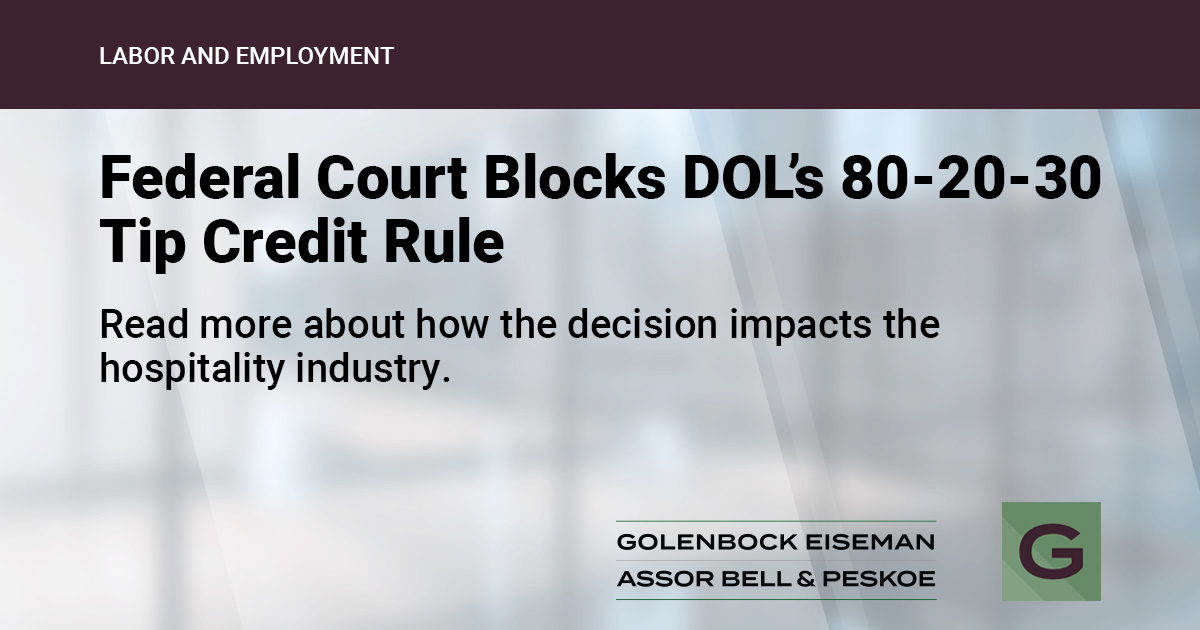On April 28, 2023, the U.S. Court of Appeals for the Fifth Circuit reversed a decision by the Western District of Texas that had originally denied the Restaurant Law Center’s and the Texas Restaurant Association’s preliminary injunction request, which sought to enjoin the U.S. Department of Labor’s (“DOL”) so called “80/20/30 Rule,” which took effect December 28, 2021. This administrative rule tightened the requirements for when employers can apply a tip credit against the Fair Labor Standards Act (“FLSA”) minimum wage.
As a brief background, the FLSA allows employers to satisfy the federal minimum wage for tipped employees by paying a reduced hourly wage and making up the difference through a tip credit, up to $5.12 per hour, if tips actually received are sufficient to fulfill the difference between the tipped wage and the minimum wage, and provided the employer meets certain additional requirements.
Under prior DOL guidance, an employer was able to take the tip credit for an employee’s tip-producing work, as well as for other work that supports tip-producing work in keeping with a category scheme issued by the DOL during the Trump administration. The DOL’s new guidance (under the Biden administration), reverted to the “80/20 Rule” (in effect prior to the Trump administration’s change), which required a tipped employee’s “supporting”, i.e., non tip-producing work may not exceed 20% of the employee’s workweek if the employer wished to benefit from the tip credit.
The new rule went a step further and added an additional limitation that a tipped employee’s directly supporting work may not exceed 30 consecutive minutes or cumulatively more than 20% of the tipped employee’s workweek. The new 30-minute requirement presented significant challenges for employers whose tipped employees perform preparatory and concluding work incidental to their tipped duties. The DOL indeed expressly acknowledges that “some employers may incur ongoing management costs . . . to ensure that tipped employees are not spending more than 20 percent of their time on directly supporting work per workweek, or more than 30 minutes continuously performing such duties.”
The Restaurant Law Center and the Texas Restaurant Association challenged the 80/20/30 Rule starting in December 2021, alleging that it violates the FLSA, exceeds the DOL’s rulemaking authority, and creates significant, irreparable compliance burdens, among other challenges. The district court denied the preliminary injunction but the Fifth Circuit Court of Appeals disagreed, finding that the lower court ignored cost estimates advanced by the restaurant groups and disregarded circuit precedent that nonrecoverable compliance costs usually constitute irreparable harm. Of particular note, the Fifth Circuit found that the addition of the 30 continuous minute limitation creates significant recordkeeping obligations and costs for employers that did not exist before. The court explained, “[t]hose omissions are striking, given that plaintiffs assert that their members will incur exactly the kinds of continuing compliance costs predicted by the department itself.”
The Fifth Circuit remanded the case to the lower court for it to address other key preliminary injunction issues, i.e., whether the restaurant groups can succeed on the merits, whether the balance of equities tips in their favor and whether the injunction is in the public interest. While this appeal was pending, both parties filed motions for summary judgment on the merits.
Although further litigation of the 80/20/30 Rule is inevitable, hospitality employers are (for now) relieved of the 30 continuous-minute constraint under the FLSA. Please note that the former FLSA 80/20 Rule remains in full effect. Moreover, certain state laws, including New York’s, also impose robust tipped work and tip credit regulations that in some respects go well beyond the FLSA’s restrictions. As a result, employers are required to continue complying with these overlapping rules.
This Client Alert was written by attorneys Alexander Leonard and Gina Nicotera. Golenbock Eiseman Assor Bell & Peskoe LLP uses Client Alerts to inform clients and other interested parties of noteworthy issues, decisions and legislation that may affect them or their businesses. A Client Alert should not be construed or relied upon as legal advice. This Client Alert may be considered advertising under applicable state laws.
Golenbock Eiseman Assor Bell & Peskoe LLP
Golenbock Eiseman Assor Bell & Peskoe LLP is a full-service Manhattan-based business law firm of approximately 60 attorneys which has served its clients’ complex litigation, corporate, reorganization, intellectual property, real estate, tax, and trust & estate needs for 40 years. The firm takes pride in its sophistication, experience, and ability to take on major engagements for its domestic and international clients while also maintaining a hands-on, personalized approach to all matters.
The firm represents entrepreneurial, portfolio, and institutional clients, ranging from start-ups to Fortune 500 companies, with a specific focus on the mid-market segment. Corporate clients include middle-market private corporations, public companies, private equity firms, venture capital firms, individual investors, and entrepreneurs on a global scale.
Golenbock is a member of Alliott Global Alliance, which was recently ranked in Band 1 of global law firm networks by Chambers Guides, the prestigious international legal survey. AGA numbers 215 law and accounting firms in 95 countries on six continents, and helps member firms coordinate their clients’ global representation.
